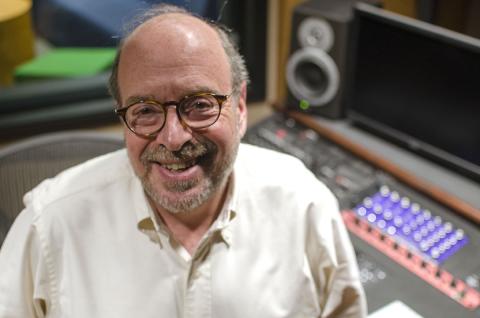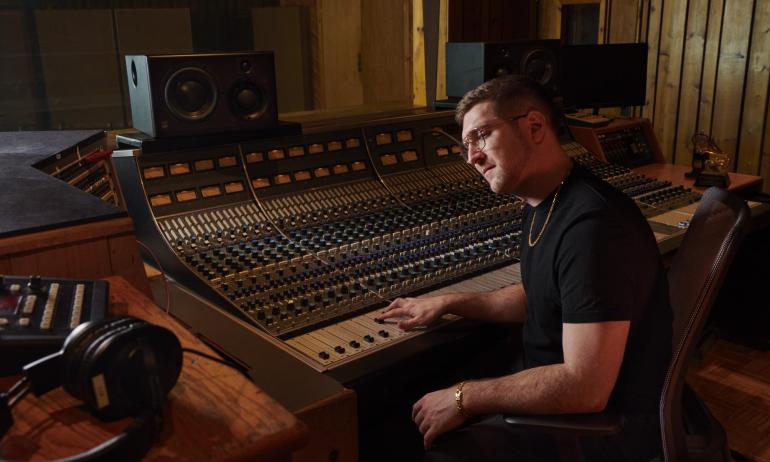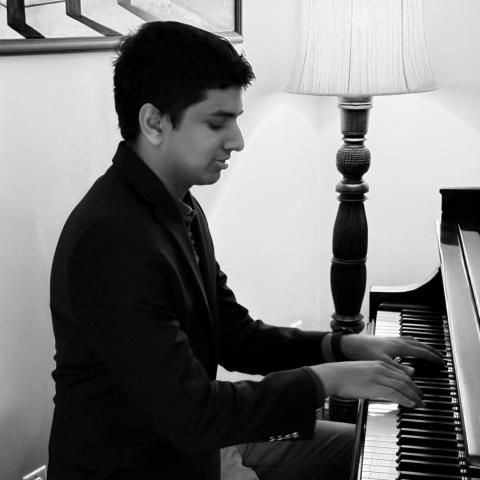Bill Elliott

Bill Elliott
Curtis Killian
Bill Elliott, professor of contemporary writing and production (CWP), knows about change. “Throughout my career,” he says, “I’ve had to be attuned to the pulse of the music business, anticipate where things were going, and reemerge as something new to fit my talents into the current demands of the music world.” Elliott is a classic self-starter musician and educator with a rich history as a player, composer, and arranger. He’s deftly weathered many shifts in taste and technology while honing his musical expertise. Elliott is determined to pass on his on-the-gig wisdom.
Growing up in Wayland, Massachusetts, Elliott had an array of musical interests. “I didn’t know if I wanted to be Leonard Bernstein or a rock musician,” he recalls. In high school, he played piano and clarinet, and wrote arrangements for the marching band’s halftime shows. Elliott, however, was not a traditional student. “I was impatient,” he concedes. “I had a good ear and liked to figure things out on my own.”
With polished keyboard chops in tow, Elliott became an A-list sideman for local bands. He relocated to Los Angeles at age 18 to perform on the first album by singer/songwriter John Compton. “It was my first experience working with studio musicians like Randy Meisner, Jim Messina, and John London,” he recalls. Afterward Elliott returned to Boston for tours with Livingston Taylor, Tom Rush, and Jonathan Edwards. “I also did my first big-band writing for entertainer Martin Mull’s variety act.” He relates, “The show covered many musical styles, including swing, country, and r&b. It was a real education learning how to arrange for these distinct genres on the fly.”
In 1977, the lure of the West Coast beckoned again, and Elliott returned to Los Angeles to tour with Bonnie Raitt. In between tours, he dove into the thriving studio scene. “I got a lot of work doing music publishing demos. Before the days of home recording, if a writer wanted to pitch a song to a record company, [he or she] would hire four players to record a live demo in the studio.” Through these sessions, Elliott met acclaimed keyboardists including Billy Payne and Jai Winding. “I made my way into the inner circle of studio keyboardists, and I chose to put touring on hold and stay in town as a session musician.”
As the 1980s unfolded, Elliott witnessed a change in tastes in popular music, which prompted him to emphasize writing and arranging. “Punk and new wave suddenly became the rage,” he recounts. “I couldn’t see myself playing synth in a new-wave band, so I focused on getting more arranging and writing work, which I had learned earlier and could do just as well as playing keyboards.”
The decision proved fortuitous for Elliott as he entered the world of television and film music. He got a foot in the door scoring low-budget films for little or no compensation. It paid off in 1989 when he wrote the song “Pep, Vim and Verve” for the Warren Beatty film Dick Tracy. Elliott discovered a niche. “It was a 1930s big-band style number, which was a genre I had always felt an affinity for but had thought of as an avocation separate from my contemporary pop music career.” He continues, “But here was something I excelled at, and few others were doing it.” Elliott discovered a niche in writing new music that sounded like older music.
Elliott’s success snowballed and led to work writing for the TV show Northern Exposure as well as productions for HBO and Disney. “By the 1990s, my career was almost exclusively in arranging, composing, and orchestrating,” he says, “but I also started my own big-band act, and we took advantage of the swing dance revival in the late ’90s.”
Though Elliott remained swamped with film, television, and children’s music for years, the work dried up as the new millennium began. “I was eager to return to the Boston area, and a position opened up in Berklee’s CWP department.” Despite his somewhat lean academic credentials, Elliott’s broad, real-world experience made him an ideal candidate. His expansive experience fits the bill to teach CWP students. “Whether it’s writing a jingle, pop song, or big-band arrangement, having those wide-reaching abilities will only help a career,” he says.
Returning to Boston also helped Elliott land work with the Boston Pops, for whom he’s written more than 50 pieces. Elliott also received an Emmy nomination in 2012 for his work with Michael Feinstein on the PBS documentary The Sinatra Legacy. Elliott’s other career emphasis has been writing for Broadway shows such as Anything Goes and Nice Work If You Can Get It. The latter received nominations in 2012 for Tony and Grammy awards. “I’m excited to see the expanding popularity of Broadway music at Berklee,” he notes, “not just for its musical merit but also because theater composing is in high demand and financially rewarding for talented writers.” Currently, Elliott is working with artist Josh Groban on a Broadway-themed album to be released later this year.
The ability to reinvent himself is the main ingredient in Elliott’s musical longevity. “Students should expect to do this several times,” he asserts. “Whatever passion you may have had as a young person may disappear from the pop scene by the time you’re 25 or 30,” Elliott observes. “Though music is always changing, its styles have a way of cycling back. Much of my recent work includes arrangements of songs popular in the ’60s, ’70s, and ’80s. I encourage students to have a [broad] education across the decades of pop music, develop their special skills, and find their niche. If you’re adaptable and nimble and can identify the hot spots in the field, you can make a living doing this.”
Ryan Fleming ’03, a guitarist and recording artist, is the assistant director of the Berklee Fund.




